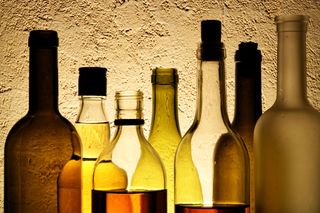1 in 3 Adults Drink Excessively, but Aren't Alcoholics, CDC Finds

About a third of U.S. adults drink excessively, but most of these people are not alcoholics, according to a new report from the Centers for Disease Control and Prevention.
The study analyzed information from more than 138,000 U.S. adults between 2009 and 2011.
Nearly 1 in 3adults was an excessive drinker, usually because they engaged in binge drinking on multiple occasions. Excessive drinking is defined as either binge drinking — consuming four or more drinks on an occasion for women, five or more drinks on occasion for men — or consuming eight or more drinks per week for women, and 15 or more per week for men. Any alcohol use by people under 21 or pregnant women is also considered excessive drinking.
However, only about 10 percent of excessive drinkers are alcohol dependent, meaning they have a craving for alcohol, they continue to use alcohol despite repeated problems with drinking, and they have an inability to control their alcohol consumption.
Even among people who reported binge drinking 10 or more times per month, more than two-thirds did not meet criteria for alcohol dependence, the researchers said. [7 Ways Alcohol Affects Your Health]
Overall, about 1 in 30 (3 percent) of adults are alcohol dependent, the report found.
Binge drinking was most common among people with annual family incomes of more than $75,000, while alcohol dependence was most common among people with incomes less than $25,000, the report said.
Sign up for the Live Science daily newsletter now
Get the world’s most fascinating discoveries delivered straight to your inbox.
Drinking too much alcohol is responsible for 88,000 deaths yearly in the U.S., costing $223.5 billion in 2006, the report said.
"Although alcohol dependence is an important public health problem, these findings suggest that most excessive drinkers are unlikely to need addiction treatment," the researchers wrote in the Nov. 20 issue of the journal Preventing Chronic Disease.
A more comprehensive approach to reducing excessive drinking, which may include policies such as increasing alcohol taxes, and screening for excessive alcohol use at doctors' visits, may have a greater impact than strategies that focus on addiction treatment services alone, the researchers said.
Follow Rachael Rettner @RachaelRettner. Follow Live Science @livescience, Facebook & Google+. Original article on Live Science.

Rachael is a Live Science contributor, and was a former channel editor and senior writer for Live Science between 2010 and 2022. She has a master's degree in journalism from New York University's Science, Health and Environmental Reporting Program. She also holds a B.S. in molecular biology and an M.S. in biology from the University of California, San Diego. Her work has appeared in Scienceline, The Washington Post and Scientific American.